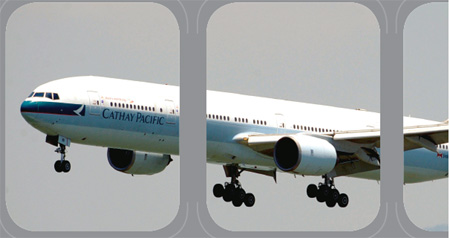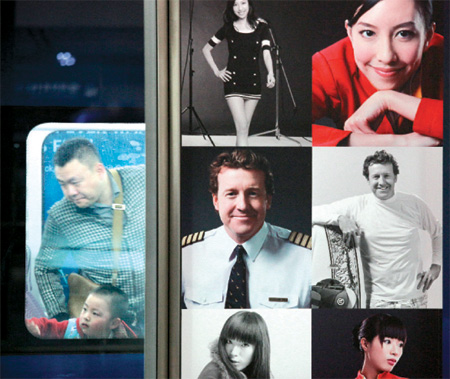Cathay Pacific's winter of discontent
Updated: 2011-01-11 07:19
By Simon Parry(HK Edition)
|
|||||||||

|
Cathay Pacific advertisement is displayed as passengers board the airport express train in Hong Kong. Ed Jones / AFP |
First it was the pilots. Now Cathay Pacific's flight attendants are contemplating a work-to-rule in pursuit of a better pay deal. Simon Parry asks why labor relations at the airline seem to have soured in a winter that has seen it announce anticipated record profits of HK$12.5 billion.
It's mind-boggling to imagine how many miles Shirley has flown since she began working for Cathay Pacific 23 years ago - how many in-flights meals she's served and how many difficult, truculent passengers she's had to deal with.
Now aged 42 and a senior purser, she might imagine she would be looking back on long and happy career. Instead, she spent Monday afternoon voting in favor of a work-to-rule by flight attendants that could disrupt Chinese New Year flights.
"I have given half of my life to the company," said Shirley (not her real name) whose take-home pay combined with entitlements the end of the month is up to around HK$31,000. "I have been working for them for so long but I feel there is no mutual respect. The company has grown so big that I am just a number.
"I am still loyal to Cathay Pacific. I love my work and I have a good performance record. But I feel as if they just ignore the good work I do. I am not valued."
Shirley is one of a group of around 140 senior flight attendants who, five years ago, refused to switch from 72 to 76-hour monthly contracts at Cathay Pacific's request. Since then, according to their union the Flight Attendants' Union (FAU), they have been "punished" with a refusal to give them any pay rise or jump in pay grade.
Other less senior pilots are similarly disillusioned. Jodie (also not her real name), a 30-year-old hourly-paid flight purser who, after eight years with the airline earns around HK$20,000 a month, says her pay is falling behind High Street prices year by year.
"I am really disappointed with what has been happening," she said. "The Hong Kong economy is in great shape and in the market, prices are going up a lot - so we find our salaries just can't compete with the rising prices. It's as if we're getting pay cuts every year." Jodie too voted in favor of contract compliance Monday.
Cathay Pacific has offered its flight attendants a 4.5 percent pay rise but the FAU - which represents 5,800 of the airline's 7,200 Hong Kong-based cabin crew - has rejected the offer and called on the airline to return to the negotiating table, a request that has so far been rebuffed.
The FAU says the 4.5 percent offer is inclusive of a contractual annual grade jump averaging 3 to 3.5 percent, meaning the actual rise on offer is only 1 to 1.5 percent. It claims that its 3,000 monthly-paid crew, by being given only contractual annual grade jumps since 1998, have effectively been subjected to a pay freeze for more than 12 years.
According to FAU figures, the average monthly salary for a flight attendant with Cathay Pacific was HK$16,000. Today, it says, the figure has increased by only HK$600 a month to HK$16,600. More than 3,000 flight attendants have signed a petition calling on Cathay Pacific to return to the negotiating table.
The FAU wants a 4.5 percent pay rise for its members exclusive of the grade jump. But the demand has been rejected by the airline which says it carried out sufficient consultation with flight attendants before making the pay proposal and has ruled out a reopening of negotiations.
The airline has described its pay offer as fair and balanced and claims many cabin crew members have already given a "positive response" to the pay offer.
The threat of a work-to-rule comes weeks after pilots voted in favor of similar action in their long-running pay battle with Cathay Pacific. That threat has been stalled by a pay offer giving Hong Kong-based pilots rises of up to 9.2 percent by May 2012, which is currently being voted on by pilots with results expected by the end of January.
If pilots vote the pay rise down, there is the prospect of both flight attendants and pilots declaring contract compliance over the Chinese New Year holiday in early February - one of the busiest times of year for flights and a time when a dual work-to-rule action would arguably have the greatest possible impact on passengers.
"I hope we support each other's actions," said Becky Kwan Siu-wa, vice-chairwoman of the FAU, who famously once accused the pilots union of lacking balls when it ended its financial support for the group of pilots known as the 49ers who were sacked by Cathay Pacific in 2001.
Relations have since been repaired since that 2005 spat and Kwan played humorously on the theme when she sent out circulars urging members to respond to the airline's offer to pilots by voting in favor of contract compliance by flight attendants in a circular headed "Caviar for pilots versus fish balls for cabin crew."
Kwan said in an interview with China Daily: "I think we should support each other. We are in the same boat as the pilots - although we flight attendants are in a rowing boat eating fish balls while the pilots are on an ocean liner eating caviar."
The FAU sees Cathay Pacific's refusal to return to the negotiating table as a direct challenge to the union's power. "Their adamant response is a clear message to challenge and test our strength and tolerance," Kwan said. "They are really trying to get everyone on the street. I think they want to see how far we will go. I have no other explanation.
"We are definitely very angry, especially when we see that the AOA has negotiated a much better deal. But we don't hate the pilots for being able to achieve better. They have done a lot of preparation and shown a lot of solidarity by voting 94 percent (in November) in favor of contract compliance. But Cathay has slammed the door on us by giving us a unilateral offer and refusing to negotiate.
"We are a lower salary group and yet we are getting a smaller percentage rise while the pilots, who are a higher salary group, are given a bigger percentage rise. That means the difference between us will continue to get bigger and bigger."
Kwan insisted the FAU's demand for a 4.5 percent pay rise in real terms was not unreasonable. "When the company has made such a huge profit the least they should do is compensate all the hard work and compensate all the pay rises that we were deprived of all these years," she said.
"When the economy was bad they asked us to go for unpaid leave which is the same as asking employees for money. Now times are good, they are so stingy. Our modest demand would cost the airline HK$70 million - that works out at about five cents per passenger per crew member per hour."
So what effect would a work-to-rule by flight attendants have, in particular one that takes place over the Chinese New Year period potentially at the same time as a similar action by pilots? "We will see flight delays and those flight delays as you know will have a knock-on effect," Kwan predicted.
"We will definitely not be doing the company any favors by working on our days off. And we have also advised our members to be 100 percent fit so that nobody risks going on a flight if they have any doubt they might be ill and might pass an infection on to passengers."
Passengers might also find their in-flight service affected in unexpected ways in the event of a work-to-rule. "On busy short-haul flights, if we really have to wait for the fasten seatbelt sign to go off before we start the service it can mean that maybe half of the passengers don't get their meal before the plane lands.
"We bend over backwards sometimes in order to ensure our passengers get their meals. Sometimes we put ourselves at risk by starting the service when the plane is still climbing. If we withdraw goodwill we will probably want to take care of ourselves first."
There is the possibility too that the action might escalate if the pay dispute remains unresolved. "All things are possible," said Kwan. "If we start our work to rule and the company remains adamant, we will eventually have no choice but to escalate our action.
"We have to be prepared. We have to plan for further action. I still maintain there is no reason for Cathay to test our strength. If we have to resort to action, the responsibility rests with Cathay and not with us. I think our demands are very reasonable."
Commenting on the pay talks, Quince Chong, Cathay Pacific's Director of Corporate Affairs, said: "The pay arrangements for staff had already been announced to all staff in November last year after many rounds of talks with the union.
"Our pay package to all eligible staff, including cabin crew, was a net increase of 4.5 percent to both monthly paid crew on master pay scale and hourly paid crew. That's fair because our policy is that all crew should enjoy the same increase for their contribution to the company's success.
"Additionally, all eligible staff including cabin crew received the year-end bonus of one month's salary, plus a minimum of five weeks profit share when the company announces full year results in early March."
She added that the company planned to recruit 800 to 1,000 flight attendants and said more than 600 existing cabin crew would be promoted to more senior positions.
The willingness of both flight attendants and pilots to press for what many of them believe they are entitled to could now be sorely tested in the remainder of a winter that may see relations between management and staff at Hong Kong's flagship airline get frostier still.
(HK Edition 01/11/2011 page4)
